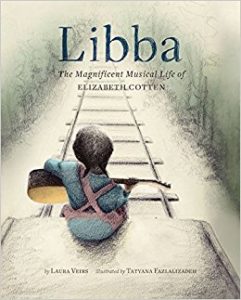 Elizabeth Cotten was a self-taught musician who learned to play the guitar upside down and backwards, as she was left handed. While she composed her first song at the age of 13, she didn’t start performing or receive recognition for her work until she was a grandmother. Laura Veirs tells the story of this woman who loved making music in a picture book called Libba: The Magnificent Musical Life of Elizabeth Cotten.
Elizabeth Cotten was a self-taught musician who learned to play the guitar upside down and backwards, as she was left handed. While she composed her first song at the age of 13, she didn’t start performing or receive recognition for her work until she was a grandmother. Laura Veirs tells the story of this woman who loved making music in a picture book called Libba: The Magnificent Musical Life of Elizabeth Cotten.
Today, Libba Cotten is most known for the folk song, “Freight Train,” which became an international hit in the 1950s and is still revered today. Cotten’s path to performing took a winding route, from her poor upbringing in North Carolina, to family life and domestic jobs, to a chance encounter with a musician who hired her as a housekeeper. Although Libba didn’t play guitar for decades, she never lost her love of making music.
As illustrator, Tatyana Fazlalizadeh captures the somber tone of Libba’s life while infusing a sense of musicality and quiet joy into the drawings. An author’s note at the back gives more information about Libba’s life as well as suggestions for places to find more information.
Author Viers, herself an acclaimed singer songwriter, talks about her own history with “Freight Train,” her surprise at discovering the story of the woman who wrote it, and her desire to tell that story. Libba is a story of serendipity, triumph, and an unwavering commitment to producing art to soothe the soul.
The publisher provided me with a copy of this book in exchange for my honest review.

